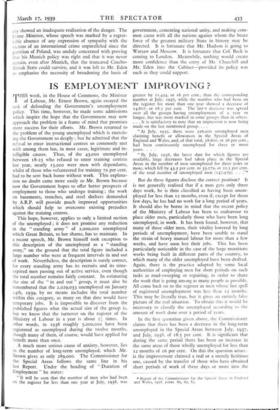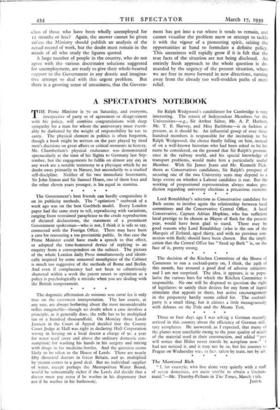IS EMPLOYMENT IMPROVING ?
THIS week, in the House of Commons, the Minister of Labour, Mr. Ernest Brown, again essayed the task of defending the Government's unemployment policy. This time, however, he made some admissions which inspire the hope that the Government may now approach the problem in a frame of mind that promises more success for their efforts. Mr. Brown returned to the problem of the young unemployed which is exercis- ing the Government so deeply ; but he admitted that the refusal to enter instructional centres so commonly met with among them has, in most cases, legitimate and in- telligible causes. Thus, of the 43,000 unemployed between 18-25 who refused to enter training centres last year, nearly 15,000 were men with dependants, whilst of those who volunteered for training 7o per cent. had to be sent back home without work. This explana- tion no doubt came more easily to Mr. Brown because now the Government hopes to offer better prospects of employment to those who undergo training ; the work on basements, trenches, and steel shelters demanded by A.R.P. will provide 1;such improved opportunities which should help to overcome existing prejudice against the training centres.
This hope, however, applies to only a limited section of the unemployed ; it does not promise any reduction in the " standing army " of 2,000,000 unemployed which Great Britain, to her shame, has to maintain. In a recent speech, Mr. Brown himself took exception to this description of the unemployed as a " standing army," on the ground that the total figure included a large number who were at frequent intervals in and out of work. Nevertheless, the description is surely correct, for every standing army has its recruits and its time- expired men passing out of active service, even though the total number remains fairly constant. In estimating the size of the " in and out " group, it must also be remembered that the 2,029,033 unemployed on January 14th, 1939, by no means includes the total number within this category, as many on that date would have temporary jobs. It is impossible to discover from the published figures what the actual size of the group is, but we know that the turnover on the register of the Ministry of Labour in a year is about 21 times. In other words, in 1938 roughly 5,000,000 have been registered as unemployed during the twelve months, though many of them, of course, would have applied for benefit more than once.
A much more serious cause of anxiety, however, lies in the number of long-term unemployed, which Mr. Brown gives as only 289,000. The Commissioner for the Special Areas follows the same line in his last Report. Under the heading of " Duration of Employment " he states : " It will be seen that the number of men who had been on the register for less than one year at July, 1938, was greater by 11,434, or 16 per cent., than the corresponding number at July, 1937, while the number who had been on the register for more than one year showed a decrease of 14,807, or 18.5 per cent. The latt-r decrease was spread over all the groups having unemployment of a year or longer, but was more marked in some groups than in others. . . . It is satisfactory to note that an impression is now being made on the last mentioned group. . . .
"At July, 1935, there were 226,000 unemployed men claiming benefit or allowances in the Special Areas of England and Wales, and, of that total, 58,600, or 26 per cent., had been continuously unemployed for three or more years. . . .
" By July, 1938, the latest date for which figures are available, large decreases had taken place in the Special Areas in the number of men unemployed for three years or more, which fell by 43.2 per cent. to 33,279, or 22.5 per cent. of the total number of unemployed men (147,979). • • ."*
But do these figures disclose the correct position? It is not generally realised that if a man gets only three days work, he is then classified as having been unem- ployed for less than 12 months, even if, except for those few days, he has had no work for a long period of years. It should also be borne in mind that the recent policy of the Ministry of Labour has been to endeavour to place older men, particularly those who have been long unemployed, in work. It has been found, however, that many of these older men, their vitality lowered by long periods of unemployment, have been unable to stand the strain of heavy manual labour for more than a few weeks, and have soon lost their jobs. This has been particularly noticeable in the case of the large munitions works being built in different parts of the country, to which many of the older unemployed have been drafted.
Again, there is the practice adopted by some local authorities of employing men for short periods on such tasks as road-sweeping or repairing, in order to share the work that is going among as many people as possible. All come back on to the register as men whose last spell of registered unemployment was less than 12 months.
This may be literally true, but it gives an entirely false picture of the real situation. To obtain this it would be necessary to classify the unemployed according to the amount of work done over a period of years.
In the first quotation given above, the Commissioner claims that there has been a decrease in the long-term unemployed in the Special Areas between July, 1937, and July, 1938, of 18.5 per cent. It is significant that during the same period there has been an increase in the same areas of those wholly unemployed for less than 12 months of 16 per cent. On this the question arises : is the improvement claimed a real or a merely fictitious one, caused by the transfer of those who have obtained short periods of work of three days or more into the
* Report of the Commissioner for the Special Areas in England and Wales, 1938, paras. 6o, 62, 63.
class of those who have been wholly unemployed for 12 months or less? Again, the answer cannot be given un'ess the Ministry should publish an analysis of the actual record of work, but the doubt must remain in the minds of all who study the figures quoted.
A large number of people in the country, who do not agree with the various doctrinaire solutions suggested for unemployment, are ready to give their whole-hearted support to the Government in any drastic and imagina- tive attempt to deal with this urgent problem. But there is a growing sense of uneasiness, that the Govern- ment has got into a rut where it tends to remain, and cannot visualise the problem anew or attempt to tackle it with the vigour of a pioneering spirit, seizing the opportunities at hand to formulate a definite policy. This uneasiness will rapidly grow if it is felt that the true facts of the situation are not being disclosed. Art entirely fresh approach to the whole question is de- manded by the urgency of the present situation, where we are free to move forward in new directions, turning away from the already too well-trodden paths of mere relief.











































 Previous page
Previous page